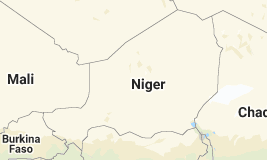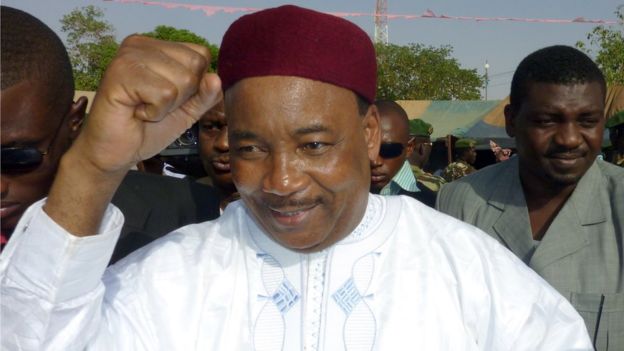
Niger

Brief Overview
Niger is a vast, Sub-Saharan country, located in the heart of the Sahel region, with an estimated population of 22.4 million (2018). The Nigerien economy is not well diversified and depends primarily on agriculture, which represents 40% of its gross domestic product (GDP).
Political Context
The current president, Mahamadou Issoufou, was reelected to a second term in 2016. The next presidential and legislative elections will be held in 2021, preceded by municipal and regional elections.
Security conditions have deteriorated in recent years, particularly in the areas bordering Nigeria, Burkina Faso, and Mali, where armed groups have established bases and carry out repeated attacks against the security forces and civilians. To date, the government has declared a state of emergency in the Diffa, Tahoua, and Tillabéri regions.
Niger is a member of the G5 Sahel, which also includes Burkina Faso, Mali, Mauritania, and Chad.
In June 2017, France, Germany, the European Union, the World Bank, the African Development Bank, and the United Nations Development Programme launched the Sahel Alliance to help respond to the challenges faced by the G5 Sahel member countries. Since then, Italy, Spain, the United Kingdom, Luxembourg, Denmark, and the Netherlands have joined the Alliance.
Economic Developments and Outlook
Economic growth increased from 4.9% to 6.5% between 2017 and 2018, surpassing the estimated potential growth rate of 4.8%. This increase is due primarily to the sound performance of the agricultural sector and sustained activity in the construction and services sectors.
The external current account deficit (including grants) worsened, from 15.7% of GDP in 2017 to 18.2% in 2018, owing to significant infrastructure projects under way financed primarily by development partners, and to a lesser degree by foreign direct investment (FDI).
The fiscal deficit (including grants) fell from 5.7% of GDP in 2017 to 4.1% of GDP in 2018. This decline is explained by the sharp increase in total fiscal revenue, which largely offset the increase in expenditure. This fiscal deficit was financed by domestic or external concessional and regional loans. Public debt dropped slightly, from 54.4% of GDP in 2017 to 53.8% in 2018.

The Republic of Niger
Capital: Niamey
Population: 16.6 million
Area: 1.27 million sq km (489,000 sq miles)
Major languages: French (official), Hausa, Songhai, Arabic
Major religions: Islam, indigenous beliefs
Life expectancy: 55 years (men), 56 years (women)
Currency CFA (Communaute Financiere Africaine) franc
UN, World Bank

Medium-term Outlook
The outlook is positive, with growth projected to reach an average of 6% between 2019 and 2021, which is expected to reduce poverty by 1.5%. Major projects in the agriculture, energy, and services sectors, as well as the construction of a crude oil pipeline, will support this growth. Niger’s mid-term fiscal objective is to achieve and maintain the West African Economic and Monetary Union’s (WAEMU) convergence criterion, which sets a ceiling of 3% of GDP for the overall fiscal deficit. Downside risks include fluctuations in the prices of basic goods, climate shocks, and insecurity.
The African Continental Free Trade Area (AfCFTA) was launched in July 2019 on the occasion of the 12th African Union Extraordinary Summit of Heads of State and Government, which was held in Niamey. This agreement aims to promote trade across the continent and to attract more investors.
Social Context
Over the past decade, Niger has made considerable progress in the area of poverty reduction. However, extreme poverty remains very high, at an estimated 41.5% in 2019, affecting more than 9 million people.
For a number of years, Niger has become a host country to populations fleeing conflict. It currently harbors 246,000 refugees and 186,000 displaced persons, primarily in Diffa and Tillabéri and more recently, in Maradi, which is further exacerbating the country’s fragility.
Physical Contacts of the Presidency
Name of Minister:
Address:
Telephone:
Fax:
Physical Contacts of the Prime Minister’s Office
Name of Minister:
Address:
Telephone:
Fax:
Physical Contacts of the National Assembly
Name of Speaker of the House:
Address:
Telephone:
Fax:
Physical Contacts of the Chief Of State and Cabinet Ministers
Name of Minister:
Address:
Telephone:
Fax:
Physical Contacts of the Ministry of Interior
Name of Minister:
Address:
Telephone:
Fax
Physical Contacts of the Ministry of Justice
Name of Minister:
Address:
Telephone:
Fax:
Physical Contacts of the Ministry of Foreign Affairs
Name of Minister:
Address:
Telephone:
Fax:
Physical Contacts of the Ministry of Women’s Affairs
Name of Minister:
Address:
Telephone:
Fax:
Physical Contacts of the National Human Rights Commission
Name of Minister:
Address:
Telephone:
Fax:
Physical Contacts of the Police
Name of Inspector General:
Address:
Telephone:
Fax:
Physical Contacts of the Military
Name of Inspector General:
Address:
Telephone:
Fax:
Important Information of Key Human Rights Issues in Niger
Number Prisons in Niger
Number Prisoners in Niger:
Secret Detention Centres:
Police Stations in Niger
What are the current and ongoing human rights issues in Niger?
(1) Freedom of the Press
(2) Human Rights Defenders Issues
(3) Impunity
African Union (AU)
Joined the OAU in
Signed the Constitutive Act of The African Union on:
Ratified:Instrument Deposited:
Signed:
Ratified:
Instrument Deposited:
Signed:
Ratified:
Instrument Deposited:
Signed: –
Ratified: –
Instrument Deposited: –
4.Protocol on Amendments to the Protocol on the Statute of the African Court of Justice and Human Rights
Signed: –
Ratified: –
Instrument Deposited: –
Signed: –
Ratified: –
Instrument Deposited: –
Signed: –
Ratified: –
Instrument Deposited: –
Signed: –
Ratified: –
Instrument Deposited: –
Signed: –
Ratified: –
Instrument Deposited: –
Signed: –
Ratified: –
Instrument Deposited: –
Signed: –
Ratified: –
Instrument Deposited: –
Signed: –
Ratified: –
Instrument Deposited: –
Signed: –
Ratified: –
Instrument Deposited: –
Signed: –
Ratified: –
Instrument Deposited: –
Signed: –
Ratified: –
Instrument Deposited: –